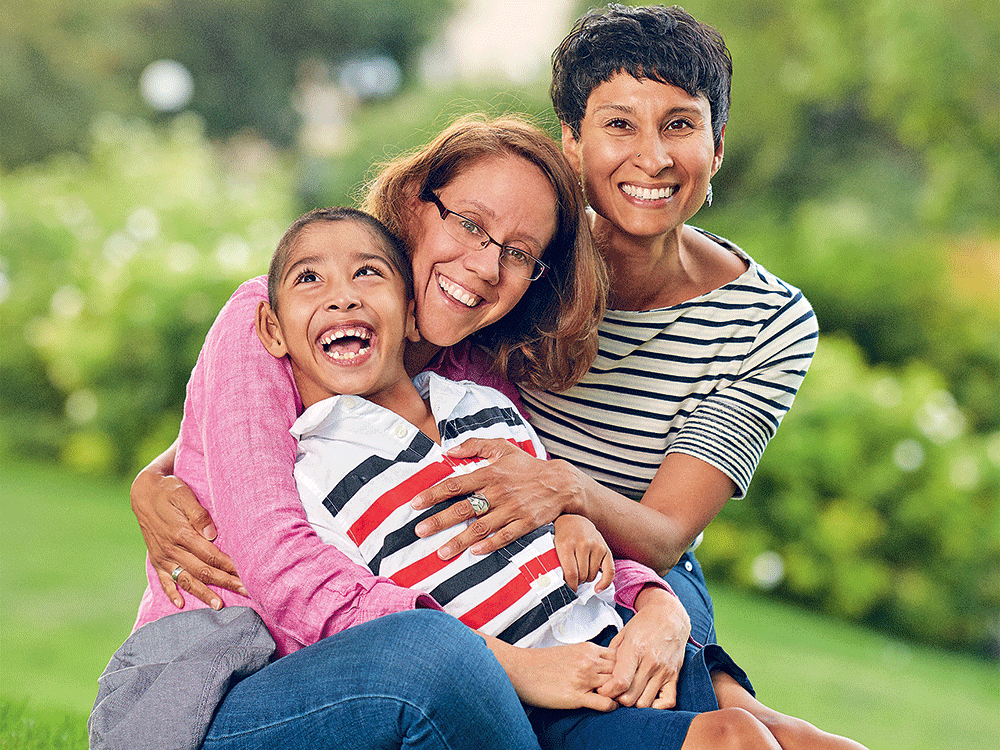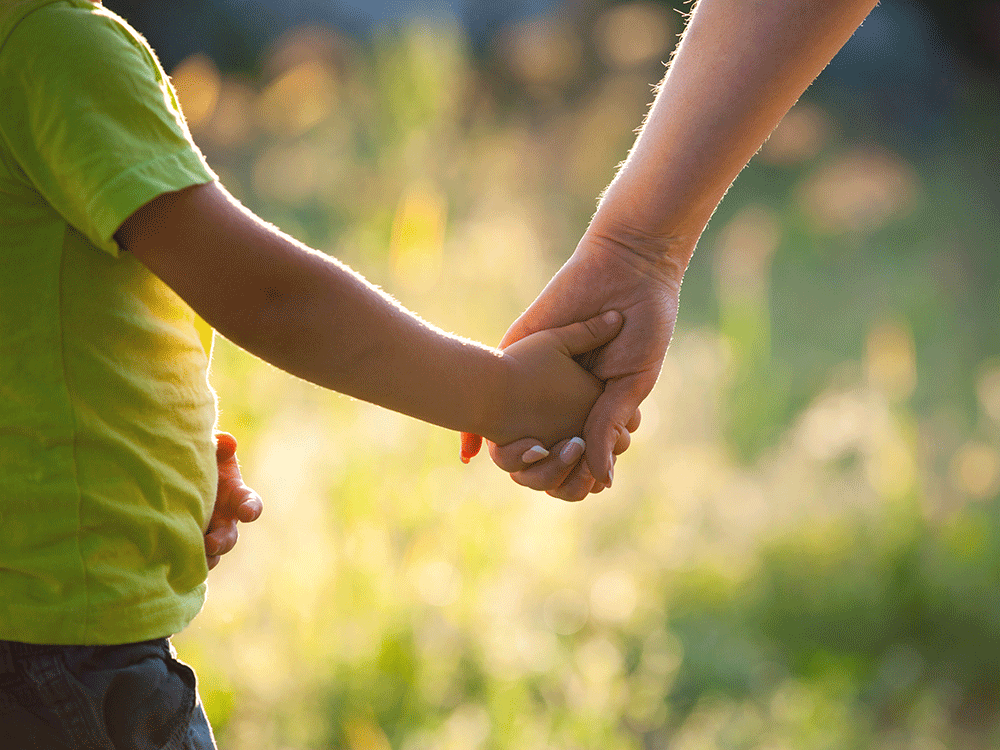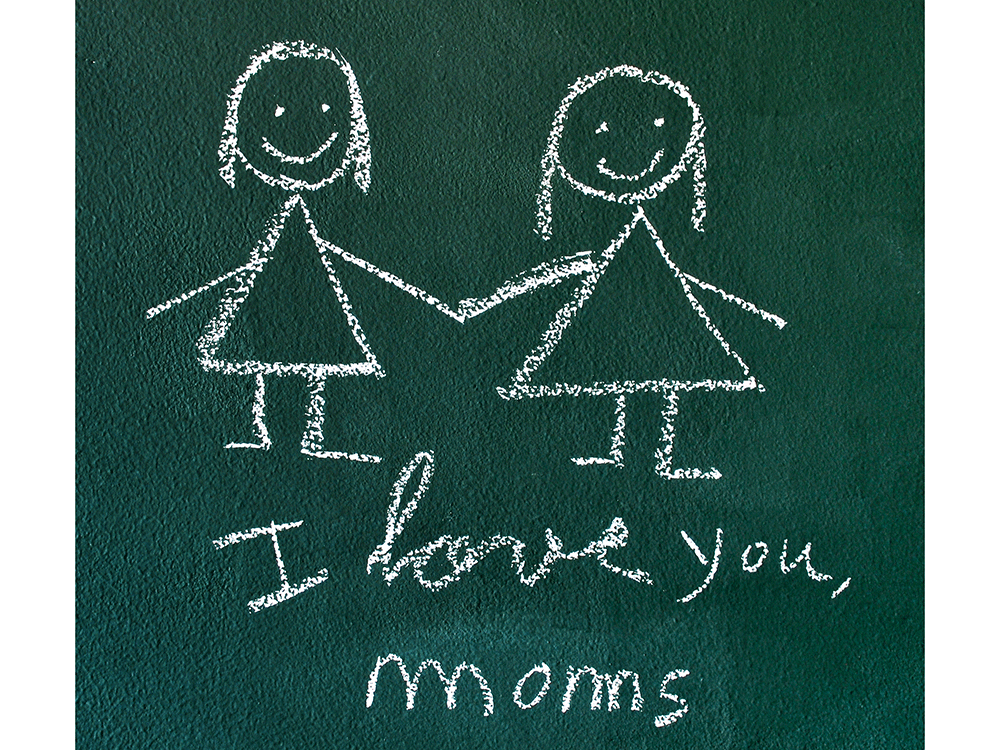
Meet the Platonic Parents
On a sunny afternoon this past May, Lynda Collins and Natasha Bakht are out for a stroll with their son, Elaan. The seven-year-old, who has severe disabilities, uses a walker, and he smiles as its wheels click along the sidewalk of the family’s downtown Ottawa block. A couple of neighbours wave. As the trio passes by a daycare, a woman who is supervising outdoor playtime calls out a hello.
When Elaan slows, the women take turns perking him up. Bakht, 45, guides him gently, while Collins, 42, stands in front and makes sounds (“Whoosh!”) or calls him by one of his many nicknames (Munchkin, Moopsie) to encourage him to come towards her. It’s a windy day, one of Elaan’s favourite times to be outside. Whenever the breeze becomes blustery, he breaks into a smile and rolls forward with it.
A stranger walking by might assume Collins and Bakht are a couple. But the two women have never been romantic partners. Instead, the “co-mamas,” as they call themselves, have redefined what an institutionally recognized family can look like in Canada. After an Ontario court granted them a legal declaration of parentage in November 2016, they became the first two people in the country to officially co-parent a child platonically. The declaration cemented what anyone close to them had long known: they, along with Elaan, are inseparable.
Bakht and Collins didn’t plan to become a family. In fact, they weren’t particularly close before 2009, when Bakht got pregnant through assisted reproductive technology using an anonymous sperm donor. At the time, the women—both law professors at the University of Ottawa—had been friends and colleagues going on three years.
Collins, who has a soft spot for babies, asked if she could be Bakht’s birth coach, and they grew closer while prepping for Elaan’s arrival.
Heather McLeod-Kilmurray, a mutual friend and colleague, watched the women’s connection take shape. “They were so excited for the baby,” she says, and it was clear from the beginning that they complemented each other. “Lynda is the most positive person and is brimming with enthusiasm, but she can also be a bit of a worrier,” says McLeod-Kilmurray. “Natasha is very professional and put together. She tackles challenging issues without worrying but benefits from Lynda’s optimism.”
In February 2010, Elaan was born by emergency C-section. He was beautiful and fragile, weighing just 4 pounds, 13 ounces. Collins was the first person to see him. From that point on, “she couldn’t really stay away,” Bakht says, laughing.
Soon after the birth, Bakht left for Toronto to stay with family during her maternity leave. Collins visited monthly and talked with Bakht nearly every day, but she missed Elaan terribly. “I must have spent $100 on iTunes sending him songs that I loved that I thought would make him happy,” she says.
When Bakht returned to Ottawa 10 months later, it had become clear that Elaan would have significant medical needs. He was eventually diagnosed with periventricular leukomalacia—essentially, portions of his brain are dead—leading to limited verbal and motor skills. He also suffers from frequent seizures and asthma. As a baby, he would often scream in pain as his mother ferried him to appointments, sometimes straining so hard that he’d vomit or burst blood vessels in his eyes. Bakht found herself overwhelmed.
“One day I said to Lynda, I don’t know how I’m going to do this by myself,” she recalls.
Maybe it was because she remembered how much she’d missed Elaan during their time apart, but Collins didn’t hesitate before responding.
“You don’t need to. I’m here.”

Life as Platonic Parents
There were small signs at first. By 2011, Collins was at Bakht’s place every day; she eventually decided it was easier to move into the neighbourhood and then the same apartment building. When Elaan was two, he was hospitalized unexpectedly. Collins was scheduled to speak on a panel in a different city. She cancelled immediately.
Still, they didn’t recognize their emerging dynamic until someone else pointed it out. In 2013, the friends were having dinner with a colleague at Bakht’s apartment, and Collins mentioned that she lived elsewhere. The guest was confused—she’d assumed her co-workers were dating. If they weren’t a couple, what were they? The pair explained their situation and were thrilled when they heard their colleague’s nonchalant reply: “Oh,” she said. “So you’re a family.”
Nevertheless, it took some time before Collins saw herself as a mother. She had begun to consider adopting a child of her own but worried she might not be able to handle single parenthood.
One day in 2014, while hiking in nearby Gatineau Park, she had a realization. “I thought, Why would I adopt a stranger when I already have Elaan? It was a moment of clarity.”
She wasted no time. Later that evening, while she and Bakht were feeding Elaan, Collins asked her friend the question: How would you feel about me adopting your son? After sitting in silence for a while, Bakht blurted out, “Yes.” Collins had, after all, been mothering Elaan for years, and it was obvious that he related to her as a parent.
It would be nearly two more years before Collins received formal recognition. The legal process was fairly smooth; life provided the hurdles. First, Elaan was in and out of hospital, then Collins’s grandmother was dying. Gathering the required testimonies from friends, colleagues and Elaan’s support network took time. But in April 2016, the pair submitted their application to the Ontario Court of Justice, and seven months later, they received their declaration of parentage.
While their case was the first of its kind, it didn’t set a legal precedent. Soon after the declaration, Ontario passed the All Families Are Equal Act, designed to make parentage for people who were using assisted reproduction easier. The new act meant Collins and Bakht’s case was impossible to repeat. It stipulates that individuals need to form the intent to parent before conception. As a result, platonic parents who decide to form a family after a child is conceived would likely have to go through their own court proceedings.
Collins and Bakht wish this weren’t so. While they believe the act was well intentioned and progressive, they don’t think would-be parents should be limited by timing. Still, they hope their case will act as a social precedent, making the legal process less intimidating for the next set of platonic parents.

What’s Next for These Platonic Parents?
Platonic parenting as a concept isn’t new—think of a grandmother helping to raise her grandchild—but most of the research on the subject focuses on former couples parenting together. As such, it’s impossible to pinpoint how many people are informally involved in arrangements like Collins and Bakht’s. However, sites such as Coparents.com, which match strangers with prospective sperm donors, as well as platonic partners looking to start families, point to a growing trend. Coparents.com has 88,000 registered users worldwide; a similar site called Modamily.com has 2,500 Canadian users.
Bakht is pleased people are opening up to the idea of co-parenting. While many single parents thrive, she likes the idea that those who want assistance might secure it without having to also find a romantic partner. Collins’s help has allowed her to become a better mother, she says. Practically, having a second parent has doubled Elaan’s insurance coverage, which has been crucial, given his medical needs. Emotionally, raising a child with a disability can be demanding; whenever Bakht gets frustrated, her pal can step in.
Both women have also gained support from each other’s extended families. “The legal co-parenting changed things only in law,” Collins’s father, Frank, says. “Elaan has been a child and a grandchild to us all from the beginning.”
“Lynda loves referring to herself as his mother,” he says. “Having a child in her life has added a dimension that maybe she didn’t even realize had been missing.”
In the evenings, Collins takes out her acoustic guitar so the moms can sing for Elaan—kids’ songs like “Baa Baa Black Sheep” or classics like “Lean on Me.” On the weekends, they visit the playground to gently rock on a swing. Often, the friends trade nerdy law jokes, and Elaan cracks up at the sound of their laughter.
Their life may be sweet, but it’s not uncomplicated. Neither mother has ruled out a serious relationship, for example, and both understand this will likely be a point of negotiation in the future. “Anybody coming in has to recognize that they don’t only get me and the child, but his other mother,” Bakht says.
The friends experience prosaic moments of conflict, over parenting or simply when one of them forgets to wipe down the sink. In times of irritation, they give each other space, then communicate. “We’re quick to turn things around,” Bakht says. “Neither of us likes that angry feeling—”
“It’s awful,” Collins jumps in. (The women often finish one another’s thoughts.) “We can’t function without each other, so it’s not like we could be mad for long.”
In May, Bakht and Collins threw a big party to celebrate their family’s official status, packing approximately 100 people into a community-centre gymnasium for an afternoon of dancing and Indian food. Loved ones pushed Elaan around in his wheelchair to the music, a playlist curated by Collins weeks in advance. (She made sure to include Sister Sledge’s “We Are Family.”)
Towards the end of the gathering, the two women made speeches, thanking their guests and, eventually, each other. “I won’t pretend to have the words to properly convey what you mean to me,” Collins told Bakht. “Your kindness, generosity, light-heartedness, brilliance and resilient good humour have taught me so much and brought so much joy into my life. And by sharing your son, you made me a mother. ‘Thank you’ seems a little inadequate. So I’ll just plan to spend the rest of my life making both of you happy.”
Are you breaching social etiquette without even realizing it? Here are 6 Things You Should Never Say to a Single Friend!